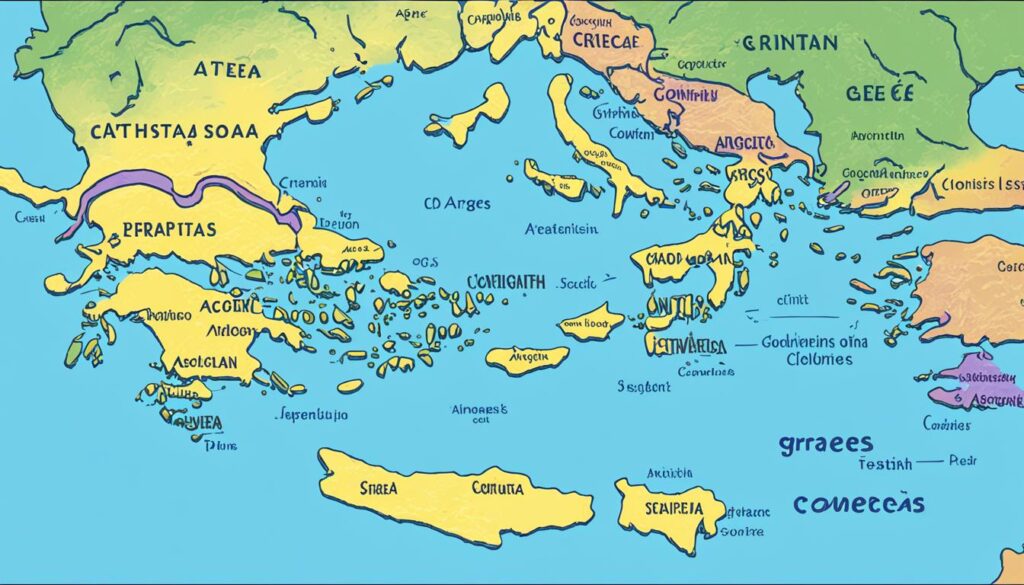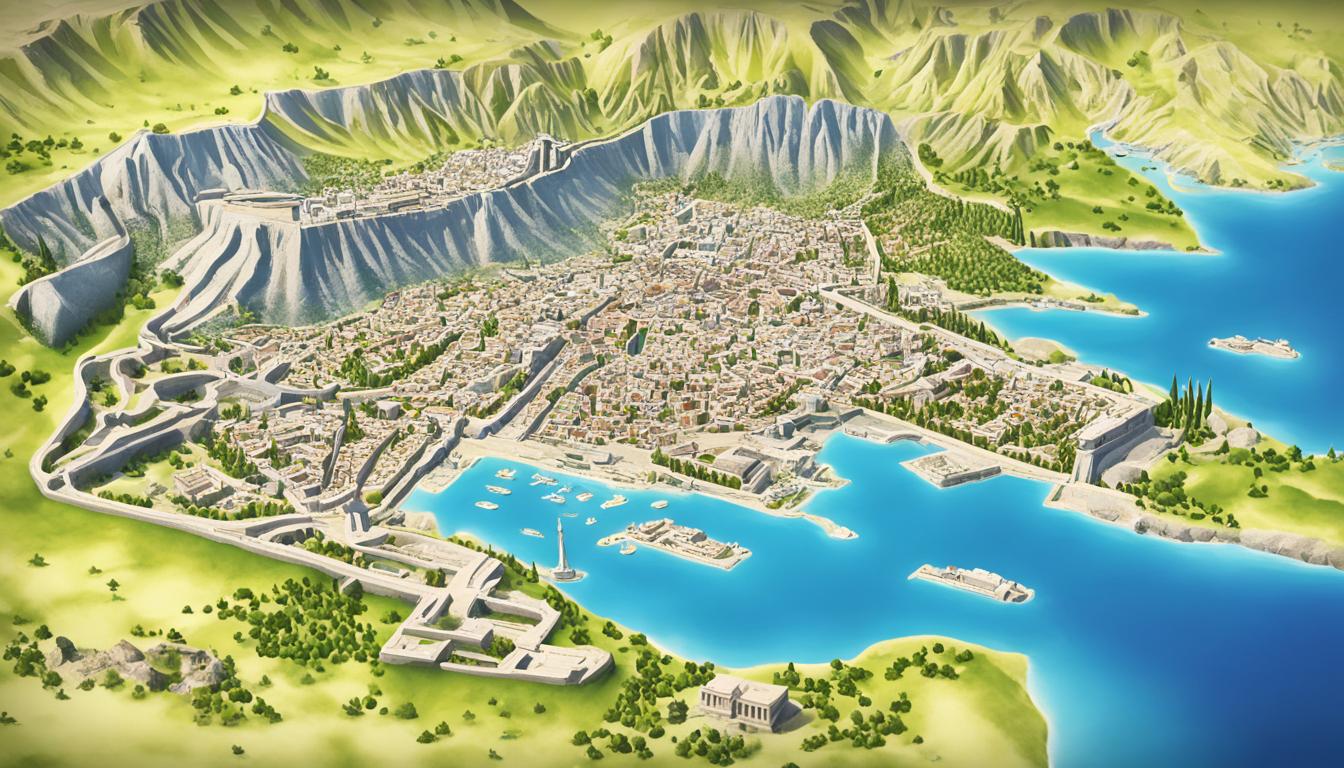Ancient Greece was a remarkable civilization, composed of various city-states with their own unique governments and political landscapes. To truly understand the rich history and cultural significance of ancient Greece, it is essential to explore the map of ancient Greece city-states. This map provides an invaluable visual representation of the diverse regions and cities that existed during this fascinating period.
Key Takeaways:
- Ancient Greece was comprised of numerous city-states, each with its own government and political structure.
- The geography of ancient Greece, with its islands, seas, and mountains, shaped the lifestyle and activities of the ancient Greeks.
- The city-states, such as Athens and Sparta, played significant roles in Greek history, culture, and politics.
- Interactive maps are available to explore the locations of ancient Greek city-states and colonies.
- The political landscape of ancient Greece was diverse, with city-states governed by democracies, monarchies, aristocracies, or oligarchies.
Location and Historical Significance of Ancient Greece City States
Ancient Greece city-states were scattered throughout the region, each with its own unique government structure, laws, and cultural traditions. Some of the well-known city-states in ancient Greece include:
- Athens
- Sparta
- Corinth
- Thebes
- Delphi
These city-states played a significant role in Greek history and culture. Each city-state had its own distinct characteristics and contributed to the development of ancient Greece in different ways.
Athens, for example, was known for its intellectual and artistic achievements. It became a center of culture in the ancient world, with renowned philosophers, playwrights, and artists contributing to its vibrant intellectual life.
Sparta, on the other hand, was known for its military prowess and discipline. The Spartan society revolved around militarism, with a strong emphasis on physical training and a strict code of conduct for its citizens.
These city-states were not only important in their own right, but they also interacted with each other and other civilizations, contributing to the exchange of ideas, trade, and cultural diffusion.
Interactive Map and Ancient Greek Colonies
If you’re curious about the locations of ancient Greek city-states, interactive maps are a valuable resource. These maps provide a visual representation of the ancient Greek world, allowing you to explore the distribution and significance of city-states throughout the region.

But the influence of the Greeks extended beyond the borders of their city-states. They established colonies in various parts of the Mediterranean and even beyond. These colonies played a crucial role in spreading Greek culture and influence across the Mediterranean basin.
Notable Ancient Greek Colonies:
- Syracuse in Sicily
- Ephesus in Asia Minor
- Alexandria in Egypt
The establishment of these colonies facilitated trade, cultural exchange, and the expansion of Greek civilization. They served as important hubs for the dissemination of ideas, as well as the diffusion of Greek customs and traditions.
Exploring the ancient Greek colonies provides a window into the far-reaching impact of Greek culture. It underscores the significance of the city-states as influential centers of learning, innovation, and progress in the ancient world.
Political Landscape of Ancient Greece
The political landscape of ancient Greece was characterized by a diverse array of city-states, each with its own unique form of government and political structure. These city-states were the fundamental units of Greek politics and played a crucial role in shaping the course of ancient Greek history. Understanding the political dynamics of these city-states is essential to comprehending the broader context of political life in ancient Greece.
One of the most notable political developments in ancient Greece was the emergence of democracy in Athens. Athens is often considered one of the first democracies in history. In this system, power was vested in the hands of the people, allowing citizens to participate directly in the decision-making process. This Athenian democracy fostered a sense of civic pride and provided citizens with a voice in governing the city-state.
On the other hand, not all Greek city-states embraced democracy. Many city-states were ruled by monarchies, where power was inherited through royal lineage. Some city-states were governed by aristocracies, where a small group of elite individuals held power based on their noble birth. Other city-states operated under oligarchies, where a few wealthy individuals controlled the government.
Political life in ancient Greece was often marked by instability and occasional violence. Rivalries and conflicts between different city-states were common and often resulted in warfare. The ancient Greek world witnessed numerous wars and military campaigns, such as the Peloponnesian War between Athens and Sparta.
Despite the political turmoil, ancient Greece also provided a fertile ground for intellectual exploration and cultural advancement. The city-states nurtured an environment that encouraged the pursuit of knowledge and the exchange of ideas. This intellectual freedom gave rise to remarkable contributions in various fields, including philosophy, literature, art, and science.
Ancient Greek Philosophy
Ancient Greek philosophers, such as Socrates, Plato, and Aristotle, delved into questions of ethics, metaphysics, and epistemology. Their philosophical inquiries laid the foundation for Western philosophical thought and continue to influence contemporary thinkers.
Ancient Greek Literature
Epics like Homer’s Iliad and Odyssey, tragic plays by playwrights like Sophocles and Euripides, and philosophical works like Plato’s Republic and Aristotle’s Poetics showcase the literary achievements of ancient Greece. These works explore universal themes and emotions, leaving a lasting impact on literature.
Ancient Greek Art and Architecture
Ancient Greek art and architecture exemplify beauty, symmetry, and harmony. The Parthenon in Athens, sculptures like the Venus de Milo and the Winged Victory of Samothrace, and vase paintings demonstrate the artistic prowess and attention to detail of ancient Greek artisans.
Ancient Greek Science and Mathematics
Ancient Greek mathematicians and scientists, such as Euclid, Pythagoras, and Archimedes, made significant contributions to the fields of geometry, astronomy, and physics. Their discoveries laid the groundwork for scientific inquiry and continue to shape our understanding of the natural world.
The political landscape of ancient Greece was complex and multifaceted, with city-states embodying different forms of government, ranging from democracy to monarchy and oligarchy. This diversity of political systems, combined with the vibrant intellectual and cultural climate, contributed to the richness and legacy of ancient Greek civilization.
Conclusion
The ancient Greek city-states were crucial in shaping the history and culture of Greece. Each city-state, such as Athens and Sparta, made significant contributions that left a lasting impact on the ancient Greek world. Whether it was Athens’ intellectual and artistic achievements or Sparta’s military might, these city-states showcased the diversity and complexity of ancient Greek society.
Ancient Greece’s geography, with its islands, seas, and mountains, played a fundamental role in shaping the lifestyle and activities of the ancient Greeks. The sea allowed for fishing, trading, and sailing, while the mountains limited agriculture but provided a mild climate for farming. The unique geographical features influenced the development of city-states and their distinct governmental structures and cultural traditions.
By exploring the map of ancient Greece city-states, we gain a better understanding of the political landscape and historical significance of this mesmerizing civilization. The interactive maps available today provide a visual representation of the scattered city-states throughout the region, allowing us to appreciate the rich history and heritage of ancient Greece. These city-states, with their diverse political systems and contributions to philosophy, literature, art, and science, continue to captivate and inspire us.
FAQ
Where were the city-states located in ancient Greece?
What were some of the famous ancient Greek city-states?
What were the different forms of government in ancient Greek city-states?
What were the main geographical features of ancient Greece?
What were some notable ancient Greek colonies?
What role did the city-states play in ancient Greece?
What contributions did the ancient Greeks make to philosophy, literature, art, and science?
Source Links
- https://nsms6thgradesocialstudies.weebly.com/maps-of-ancient-greece.html
- https://www.thoughtco.com/maps-of-ancient-greece-4122979
- https://timemaps.com/history/greece-500bc/
https://www.youtube.com/watch?v=jxQAWw2_Jao

